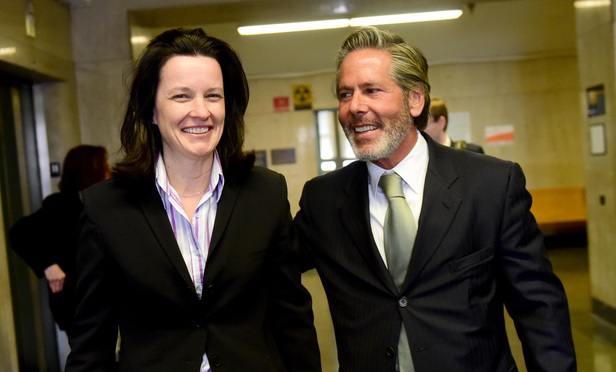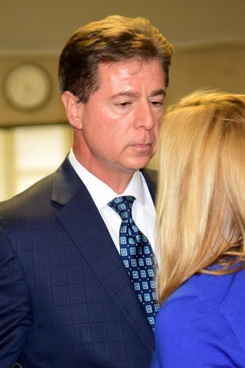 Stephen DiCarmine, right, leaving Manhattan Criminal Court with his attorney, Rita Glavin of Seward & Kissel, after he was found not guilty on Monday. (Photo: David Handschuh/ALM)
Stephen DiCarmine, right, leaving Manhattan Criminal Court with his attorney, Rita Glavin of Seward & Kissel, after he was found not guilty on Monday. (Photo: David Handschuh/ALM)
Almost exactly five years after Dewey & LeBoeuf filed for bankruptcy, a Manhattan jury on Monday found its former chief financial officer, Joel Sanders, guilty of fraudulently concealing the firm’s precarious finances ahead of its collapse.
 Joel Sanders speaks to an unidentified woman outside the courtroom after he was found guilty Monday. (Photo: David Handschuh/ALM)
Joel Sanders speaks to an unidentified woman outside the courtroom after he was found guilty Monday. (Photo: David Handschuh/ALM)
The jury of eight women and four men reached its decision after five days of deliberations and about three months of trial. Jurors found Sanders guilty of scheme to defraud, securities fraud and conspiracy, while clearing former Dewey executive director Stephen DiCarmine on the same charges.
The verdict caps a retrial that began in February, when prosecutors under Manhattan District Attorney Cyrus Vance Jr. returned to court to try to persuade jurors that DiCarmine and Sanders schemed to deceive the firm’s lenders and investors about Dewey’s financial position in the years before its May 2012 bankruptcy.
Vance’s office greatly narrowed the case after earlier trial ended with a deadlocked jury and a mistrial in 2015. The first trial included charges against former Dewey chairman Steven Davis, but he since reached a deferred prosecution and wasn’t a defendant in the retrial.
With Monday’s conviction, Sanders, 59, faces a maximum sentence of one and one-third years to four years in prison. His lead defense lawyer, Andrew Frisch, said after the verdict that he intends to file several post-trial motions. In a written statement, Frisch also said he would appeal and noted that the jury in the first trial acquitted Sanders on some of the prosecutors’ initial charges.
“Mr. Sanders won round one (the first trial), and DA Vance won round two. We expect to win round three the appeal, by a TKO: no New York appellate court has ever sanctioned the rebranding of acquitted conduct as a conspiracy or a scheme,” the statement said.
Vance’s office on Tuesday hailed Sanders’ conviction in a statement, and said the former Dewey CFO would face sentencing in October.
“Joel Sanders used his position as chief financial officer to mask the failing financial health of Dewey & LeBoeuf, leading insurers and lenders to believe the firm was still above water,” Vance said. “For years, the firm’s financial department—led by Sanders—orchestrated a scheme to hide and manipulate its losses, directing employees to alter accounts to feign compliance with the firm’s lending agreements.”
Contrasting Trials
In many ways, the retrial ran parallel to the original trial in 2015, although the second time around included fewer defendants, a shorter proceeding and far fewer charges.
The retrial jury’s five-day deliberation, however, stands in contrast to the marathon deliberations that ended the first trial in 2015. Ultimately, that jury couldn’t find consensus on most charges after 21 days.
Speaking to lawyers and press outside of the courtroom on Tuesday, one juror in the retrial, Darryl Downing, who works in information services, said the panel based its conclusions on a close look at the evidence and found that prosecutors hadn’t done enough to prove their case against DiCarmine.
“Everybody took their responsibility very seriously,” Downing said. “We went entirely on the evidence.”
The retrial featured testimony from more than 30 witnesses, six of whom cooperated with the government under plea agreements, including former Dewey finance director Francis Canellas. Assistant district attorney Peirce Moser led the government’s case, joined by fellow assistant DAs David Drucker and Gregory Weiss.
Canellas, who was a central figure in both trials, testified in the retrial for several days in March. He told jurors that Dewey faced significant financial strain between 2008 and 2012, the years that prosecutors allege fraud took place. He said the firm was at risk of breaching covenants tied to a revolving line of credit worth a total of about $100 million. Among other provisions, those loans specified that Dewey maintain a certain cash-flow level each year and prohibited the firm from distributing to partners more than the total amount of the firm’s net income in a given year.
Canellas said that in late 2008, he met with Sanders and another former Dewey employee, Zachary Warren, to discuss possible accounting adjustments that could help prevent the firm from breaching the loan requirements and triggering a default.
The former finance director testified that some of those accounting adjustments were improper, and that those were incorporated into Dewey’s income statement. Canellas also said he had discussed the improper accounting treatments with Sanders, but he denied ever speaking directly to DiCarmine about them.
DiCarmine’s lead defense lawyer, Rita Glavin of Seward & Kissel, on Tuesday greeted several jurors outside the courtroom after they acquitted her client.
“He never did anything wrong. … He never should have been charged,” Glavin said after the verdict came down. “The case was flawed from the beginning.”
A spokeswoman for the DA, Joan Vallero, said the office was disappointed about the not guilty verdict for DiCarmine but respected the jury’s decision.
“The office remains committed to investigating and, when appropriate, prosecuting not just corporations, but bad actors who direct them,” Vallero said in a statement.
Copyright New York Law Journal. All rights reserved. This material may not be published, broadcast, rewritten, or redistributed.
Scott Flaherty covers the business of law with a special focus on plaintiffs firms. Contact him at [email protected]. On Twitter: @sflaherty18.




